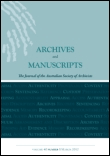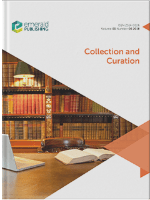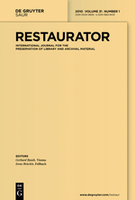
Archives and Manuscripts
Scope & Guideline
Exploring the Depths of Heritage and Knowledge
Introduction
Aims and Scopes
- Archival Governance and Ethics:
This area addresses the principles of managing and preserving records, including ethical considerations and governance frameworks that guide archival practices. - Indigenous Knowledge and Representation:
The journal highlights the significance of Indigenous perspectives in archiving, promoting methodologies that respect and incorporate Indigenous knowledge systems and practices. - Interdisciplinary Approaches to Archiving:
A consistent focus is on interdisciplinary collaboration, showcasing how various fields contribute to and enhance archival practices and documentation, particularly in relation to social issues. - Community Engagement and Participatory Archives:
Research in this domain explores how communities can actively participate in the creation and curation of archives, emphasizing the role of archives in social justice and historical representation. - Digital Archiving and Technology:
The journal examines the impact of digital technologies on archival practices, including the challenges and opportunities presented by the transition to digital formats in preserving cultural heritage.
Trending and Emerging
- Documenting Societal Change and Crisis:
Recent publications emphasize the importance of documenting contemporary societal issues, such as the COVID-19 pandemic, showcasing how archives can serve as vital resources for understanding and reflecting on significant historical events. - Participatory and Community-Focused Archives:
There is an increasing trend towards community engagement in archival projects, with a focus on participatory practices that empower communities to share their narratives and histories. - Indigenous Data Governance:
Emerging discussions around Indigenous data governance highlight the necessity of respecting Indigenous rights and knowledge in archival practices, reflecting a broader movement towards social justice and ethical archiving. - Emotional and Person-Centered Archiving:
A growing interest in the emotional aspects of archiving suggests a shift towards recognizing the personal connections individuals have with records, promoting a more human-centered approach to archival practices. - Interdisciplinary Collaborations:
There is a notable increase in interdisciplinary studies that explore the intersections of archival science with other fields, indicating a trend towards holistic approaches in understanding and documenting cultural heritage.
Declining or Waning
- Traditional Archival Terminology and Practices:
There is a noticeable reduction in papers focusing solely on traditional archival terminology and practices, suggesting a shift towards more innovative and adaptive approaches that embrace contemporary challenges. - National Web Archives:
Research specifically centered on national web archives appears to be less frequent, indicating a potential waning interest as the field moves towards more dynamic and inclusive archival practices. - Conventional Recordkeeping in Isolation:
Papers that discuss recordkeeping in isolation, without consideration of broader social implications or interdisciplinary connections, are becoming less common, highlighting a trend towards integrative approaches in archival discourse.
Similar Journals

Digital Humanities Quarterly
Empowering voices in the realm of digital scholarship.Digital Humanities Quarterly, published by the Alliance Digital Humanities Organizations, is a leading open-access journal since 2007, dedicated to advancing research at the intersection of digital technologies and the humanities. With a noteworthy ISSN of 1938-4122, this journal serves as a vital platform for scholars engaging in innovative digital methodologies across diverse fields, including arts and humanities, communication, library sciences, and computer networks. Over its converged years from 2018 to 2024, it has earned impressive rankings, notably being placed in Q2 among peers (2023) in Arts and Humanities, Communication, and Library and Information Sciences. With an impact on critical discourse and practice in digital scholarship, Digital Humanities Quarterly is essential for researchers, professionals, and students aiming to understand and contribute to this dynamic field. The journal is based in the United States at Snell Library 213, Northeastern University, Boston, MA 02115, and strives to connect a global audience through its unrestricted access model.

Revista Electronica de Fuentes y Archivos
Exploring the Depths of Historical InquiryRevista Electronica de Fuentes y Archivos is a distinguished academic journal dedicated to the exploration of historical sources and archival studies. Published by the CENTRO DE ESTUDIOS HISTORICOS PROF CARLOS S A SEGRETI in Cordoba, Argentina, this journal has been an open-access resource since 2010, ensuring that a diverse audience of researchers, professionals, and students can freely access valuable scholarly work. The journal aims to foster dialogue and dissemination of knowledge within the fields of history, archival science, and documentation studies, promoting interdisciplinary collaboration. With its commitment to enhancing historical inquiry and promoting best practices in archival management, Revista Electronica de Fuentes y Archivos plays a pivotal role in supporting the academic and professional development of those dedicated to the preservation and interpretation of historical records.

Collection and Curation
Exploring Innovative Strategies in MuseologyCollection and Curation is a prominent academic journal published by EMERALD GROUP PUBLISHING LTD, dedicated to the fields of Library and Information Sciences and Museology. With a significant impact in its domains, the journal has achieved a category quartile ranking of Q3 in Library and Information Sciences and Q2 in Museology as of 2023. It is noteworthy that in the Scopus rankings, it stands at an impressive #8 out of 83 in Museology, placing it in the 90th percentile, while also ranking #112 out of 280 in Library and Information Sciences, positioning it within the 60th percentile. Since its inception in 2018, the journal has been instrumental in advancing research and discussion around the critical themes of collection development and curation methodologies. Although it currently does not offer open access, the journal's rigorous peer-review process ensures high-quality scholarly contributions that are indispensable for researchers, professionals, and students aiming to enrich their understanding and practices in these important fields. By focusing on innovative strategies, practices, and case studies, Collection and Curation continues to shape the future of information management and museum studies.

FONTES ARTIS MUSICAE
Elevating the study of music and library sciences.FONTES ARTIS MUSICAE, with ISSN 0015-6191 and E-ISSN 2471-156X, is a distinguished journal published by A-R EDITIONS, specializing in the fields of Music and Library and Information Sciences. Established in the United States, this journal serves as a vital resource for scholars, practitioners, and students engaged in the exploration and analysis of music and its associated disciplines. With an established converged publication history from 2002 to 2024, FONTES ARTIS MUSICAE has consistently contributed to the discourse within its scope, reflected in its current quartile rankings of Q4 in Library and Information Sciences and Q3 in Music for 2023. Although not an open-access journal, it offers essential insights and research findings, appealing to a diverse academic audience. Its position within the 18th percentile of the Arts and Humanities (Music) category and 11th percentile in Library and Information Sciences underscores its growing significance in these fields, making it a critical platform for advancing knowledge and fostering collaboration.

ARCHIVAL SCIENCE
Pioneering Innovative Approaches to Archival StudiesARCHIVAL SCIENCE, an esteemed journal published by SPRINGER, is a cornerstone in the fields of history and library and information sciences. With an ISSN of 1389-0166 and an E-ISSN of 1573-7500, this journal has been pivotal in shaping academic discourse since its inception in 2001 and continues to publish cutting-edge research as it converges towards 2024. Renowned for its rigorous peer-reviewed articles, ARCHIVAL SCIENCE ranks in the top quartiles of academic performance—Q1 in History and Q2 in Library and Information Sciences—illustrating its significant impact on these disciplines. Its impressive Scopus rankings position it within the 97th percentile for History and the 70th percentile for Library and Information Sciences, making it a vital resource for scholars and practitioners alike. Readers will appreciate the journal's commitment to exploring innovative methodologies, theoretical frameworks, and practical applications within the realm of archival studies. While it does not offer open access, ARCHIVAL SCIENCE remains a must-read for those keen on advancing their understanding of archival practices and their relevance in contemporary society.

Ibersid-Revista de Sistemas de Informacion y Documentacion
Exploring the Intersection of Communication and TechnologyIbersid-Revista de Sistemas de Informacion y Documentacion is an esteemed academic journal published by IBERSID NETWORK, focusing on pivotal themes in the fields of communication, computer networks, information systems, and library and information sciences. With an ISSN of 1888-0967 and an E-ISSN of 2174-081X, this Spanish journal has been a significant contributor to scholarly discourse since its inception in 2012. Recognized in the 2023 category quartiles, it holds a Q3 ranking in communication and library and information sciences, while ranking Q4 in computer networks and communications as well as information systems, reflecting its unique intersectionality within these domains. Despite its emerging status, evidenced by its Scopus ranks demonstrating a mixed percentile across various categories, the journal is committed to advancing knowledge and fostering innovative research. Researchers, professionals, and students are encouraged to contribute to this open-access platform, further enhancing the impact and reach of vital information and documentation systems.

CANADIAN JOURNAL OF INFORMATION AND LIBRARY SCIENCE-REVUE CANADIENNE DES SCIENCES DE L INFORMATION ET DE BIBLIOTHECONOMIE
Empowering scholars through impactful research.Canadian Journal of Information and Library Science - Revue Canadienne des Sciences de l'Information et de Bibliothéconomie is a notable peer-reviewed journal dedicated to the fields of information science and library studies, published by Western Libraries. Since its inception in 1993, this journal has served as a crucial platform for disseminating high-quality research and insights into library practices, information management, and the evolving roles of information professionals. With an impact factor that reflects its standing within the academic community, it currently holds Q4 status in Information Systems and Q3 in Library and Information Sciences for 2023, indicating a growing influence in its fields. Although the journal operates without Open Access options, it remains accessible to those affiliated with institutions that support its research mission. Scholars, practitioners, and students alike are encouraged to engage with the rich content provided in this journal, which sits within the Social Sciences and Computer Science domains, making it an essential resource for advancing scholarly discourse and practical applications in the continuously evolving landscape of information and library science.

RESTAURATOR-INTERNATIONAL JOURNAL FOR THE PRESERVATION OF LIBRARY AND ARCHIVAL MATERIAL
Unraveling the Science of Preservation.RESTAURATOR-INTERNATIONAL JOURNAL FOR THE PRESERVATION OF LIBRARY AND ARCHIVAL MATERIAL, published by WALTER DE GRUYTER GMBH in Germany, is an esteemed scholarly journal dedicated to the conservation and preservation of library and archival materials. With a history spanning from its first publication in 1970, this journal has become a vital resource for professionals, researchers, and students in the fields of conservation, materials science, and media technology. The journal holds a Q2 classification in Conservation and positions itself within the top 30% of its peer category, reflecting its commitment to quality research and innovative practices. Although the journal is not open access, it offers invaluable insights into preservation methodologies, case studies, and advances in materials technology, supporting the ongoing dialogue within the conservation community. Its indexed presence in Scopus, especially notable in the Arts and Humanities and Engineering categories, further underscores its relevance and impact in shaping contemporary practices in conservation.

Bosniaca-Journal of the National and University Library of Bosnia and Herzegovina
Cultivating Innovation in Cultural ResearchBosniaca - Journal of the National and University Library of Bosnia and Herzegovina, published by the National and University Library of Bosnia and Herzegovina, is an esteemed open-access journal that has been disseminating knowledge since 2016. With an ISSN of 1512-5033 and E-ISSN of 2303-8888, this journal aims to serve as a vital resource for scholars, researchers, and practitioners in the fields of cultural studies, education, and social sciences. Despite its challenging rankings, it provides a platform for addressing and discussing the evolving landscape of Bosnian heritage, library science, and education. By prioritizing open access, Bosniaca ensures that its content is freely available to the global community, fostering collaboration and innovation in research. As it converges new insights in its 2022-2023 issues, the journal continues to play a crucial role in promoting scholarly discourse within and beyond Bosnia and Herzegovina.

Revista General de Informacion y Documentacion
Advancing Open Access Research for a Global AudienceRevista General de Información y Documentación (ISSN: 1132-1873; E-ISSN: 1988-2858), published by the esteemed Universidad Complutense de Madrid, serves as a vital open access resource in the field of Library and Information Sciences since its inception in 1991. Based in Spain, this journal provides a platform for researchers, professionals, and students to share cutting-edge research and insights relevant to the evolving landscape of information management and documentation practices. With a recognized impact factor and a current Q2 ranking in its category for 2023, the journal is positioned among the top publications in its field, holding a Scopus rank of #176 out of 280 in Social Sciences. Covering a diverse range of topics within its scope through converged years from 2009 to 2024, the Revista encourages contributions that foster innovation and critical discussions in library sciences. Emphasizing its open access model, the journal ensures wide dissemination of its articles, supporting the global knowledge community and enhancing accessibility for all stakeholders interested in the field.